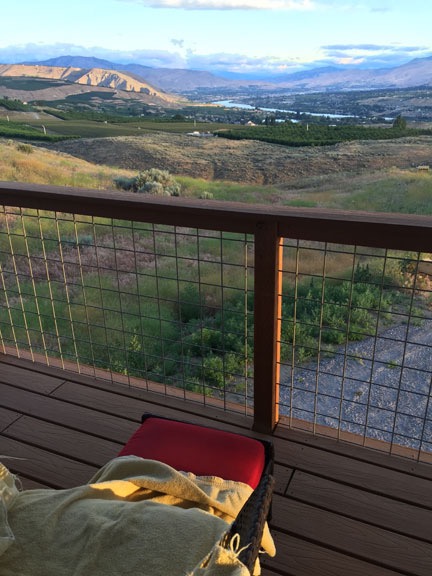I wouldn’t have it any other way.
For a long time now, I’ve been an early riser. Sometimes, a very early riser.
While I clearly remember my college days when it was nearly impossible for me to wake up in time for an 8 AM class and my early professional career days when I dreaded hearing the alarm go off at 6:30 AM, I can’t remember when I made the switch from late riser to early riser. I suppose it was a gradual change as I aged, embraced my freelance lifestyle, and allowed my life to go off-schedule.
For the past 20 or more years, I haven’t had much of a need to set an alarm or wake up at a certain time. Every day is different. Although I do occasionally have early appointments or even earlier planes to catch — my favorite flight out of Wenatchee when I’m traveling leaves at 5:40 AM; yes, I do set an alarm for that — there usually isn’t any reason to get out of bed by a certain time.
I go to sleep when I’m tired and wake up naturally when my body is done sleeping. Or thinks it’s done sleeping. Yet these days, I’m invariably up before 6 AM, often before 5 AM, and occasionally before 4 AM. (If you read the blog post about my recent cruise, you learned that I was up most mornings by 4 AM.) I am naturally an early riser.
Some folks seem to think this is a problem. They have encouraged me to stay up later in an effort to shift my body’s clock forward a few hours so it’s more in line with everyone else’s. I’ve tried this. No matter what time I go to sleep, I’m awake before 6 AM — even if I stay up until a crazy time like 3 AM. And I don’t know about you, but I operate better on six hours of sleep than three. It’s fortunate that I apparently don’t need eight.
I like being an early riser. I like getting up around dawn in the summer or in the darkness of a winter morning. I like the quiet and the solitude of those early hours before most people are awake. I like hearing the crickets in the dark as I brew my morning coffee and my rooster crowing almost precisely a half hour before dawn. I even like the sound of the sprayers in the orchards below my home during the summer months, and seeing the headlights of the tractors as they make their way between rows of trees in the dark.
I like watching each new day being born — the gradual brightening of the sky, the fading of the stars and city lights, the glow to the east, the golden hour sunlight light tentatively touching the mountaintops to the west and then slowly blanketing their slopes all the way down into the valley.

I never get tired of the morning view out my windows.
I like the fact that I can experience all of this at my own home, at my own convenience. I like taking my morning coffee out onto the deck and looking out over the new day as cool air caresses my skin and hair and the aroma of a recent rain or my fresh cut lawn competes with the smell of what’s in my mug.
I’m a morning person and get most of my work done in the morning. That’s good and bad. It’s good because it leaves the rest of the day wide open. But it can be bad if I have a lot to do and I run out of steam by 2 PM. I try to manage this drawback by scheduling appointments in the afternoon whenever possible, leaving the morning open to accomplish the things I need to do.
My usual routine consists of morning coffee as soon as I get up — whenever that is — and quiet time to reflect and write in my journal. Then I sit down at my computer and do some writing or paperwork or both. “Paperwork” usually consists of bill paying and filing, website maintenance, correspondence, client communication, and marketing material creation for my businesses. That usually takes me to 10 or 11 AM. Then I switch into more active work around my home or in my garden. There’s always something that needs to be done, especially as I finish up construction work that includes the tedious task of trimming doors, etc.
If I have scheduled an appointment or have errands to run in town, I’ll clean up, dress appropriately, and head down into town with Penny. I always have a list of destinations on a Post-It note stuck to my windshield so I don’t forget anything — I live 10 miles from town and I don’t like to make the trip more than once a day if I don’t have to. I keep shopping lists on my smartphone for the same reason. I can get a lot done on one trip into town if I stay focused and organized.
By 6 PM — especially in the winter when it’s already dark — I’m pretty much physically and mentally done for the day. That’s the time I set aside for socializing with friends and relaxing. I even find it difficult to write during this time, although I’ve been trying hard lately to make that my blogging time, leaving the morning open for writing jobs that bring in revenue. If I went to town earlier in the day, I sometimes meet up with friends in the late afternoon or early evening: wine at Pybus Market, cocktails at the Sidecar Lounge, dinner at Tastebuds, or a movie at Liberty or Gateway Cinema. If I’m home, I sometimes try a new recipe — I’ve recently rediscovered my love of cooking — and read the news or waste time on social media while eating it.
I think I watch too much television these days — more than an hour a day when I’m home in the evening — and it bugs me; my wasband was a slave to the television, channel surfing for hours every evening when he could have been working to achieve one of the life goals he claimed to have. I worry I might end up like him: unproductive and stuck in a rut.
I love to read, but if I do it in bed, I’m usually asleep within minutes. So I try not to read in bed before 9 PM.
I’m usually asleep by 10 PM — unless I’m out with friends or entertaining.
I don’t think I can adequately express how happy I am to be single and have full control of my life and time. There’s no one trying to put me on his schedule or make me share his time-consuming responsibilities. I do the things I want or need to do when I want or need to do them. I don’t have to schedule my life around someone else’s.
Best of all, I can wake up any time I like and not have to tiptoe around my home because someone else is sleeping.
I admit that I’m very fortunate to have the flexible lifestyle I have. But it isn’t “luck.” I’m a firm believer in the notion that we make our own luck. I worked hard to get where I am today and having this lifestyle is the reward for all that work. I’m a morning person and I earned the right to enjoy my mornings.
And I wouldn’t have it any other way.




